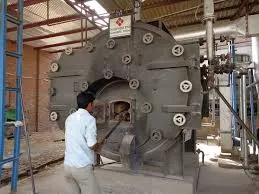
Nov . 04, 2024 18:48 Back to list
Calculating Capacity for Hot Water Boiler Systems Efficiently and Accurately
Understanding Hot Water Boiler Capacity Calculation
When it comes to heating buildings and providing hot water for domestic use, the efficiency and capacity of hot water boilers play a crucial role. A hot water boiler's capacity needs to be carefully calculated to ensure that it meets the demands of the intended application. Failing to adequately size a boiler can result in inefficient operation, higher energy costs, and even system failure. In this article, we will explore the key aspects of hot water boiler capacity calculation and its importance.
Importance of Correct Sizing
The capacity of a hot water boiler is defined as the maximum amount of heat the boiler can produce, usually measured in British Thermal Units (BTUs), kilowatts (kW), or horsepower (HP). Correct sizing is vital because
1. Efficiency An undersized boiler will struggle to meet the demand, leading to continuous operation and eventual wear and tear. An oversized boiler, on the other hand, may cycle on and off frequently, wasting energy and leading to higher utility bills.
2. Comfort For residential applications, a properly sized boiler ensures consistent and comfortable heating, providing adequate hot water for baths, showers, and other domestic needs.
3. Cost-effectiveness Investing in the right capacity can save homeowners and facility managers significant amounts in energy costs and maintenance over time.
Key Factors in Capacity Calculation
Several factors need to be considered when calculating the appropriate capacity for a hot water boiler
1. Heat Load Requirements The first step is to assess the heat load requirements of the space. This involves calculating the total heat loss from the building during the coldest weather. Factors such as insulation, window quality, and building materials all influence heat loss calculations.
2. Hot Water Demand For applications requiring hot water, such as in residential or commercial settings, you need to estimate peak hot water usage. This includes the number of fixtures (sinks, showers, etc.) and the expected usage rates during peak hours.
hot water boiler capacity calculation

3. Temperature Rise The temperature rise needed from the inlet water temperature to the desired hot water temperature is critical. Knowing the inlet water temperature (for instance, groundwater temperature) helps define how much energy the boiler must supply to raise the water to the desired level.
4. Diversity Factor In commercial applications, not all fixtures are used at peak capacity simultaneously. Applying a diversity factor, or load diversity, helps to adjust the demand estimates and can lead to a more accurate calculation.
5. Boiler Efficiency Different boilers have different efficiencies, known as the Annual Fuel Utilization Efficiency (AFUE). Higher efficiency means more heat output for the same input of fuel. Incorporating efficiency ratings into the capacity calculation is crucial for determining the actual output needs.
Calculation Steps
To calculate the required boiler capacity, follow these steps
1. Calculate Heat Loss Use the formula \[ \text{Heat Load (BTU/hr)} = \text{Area (sq ft)} \times \text{Heat Loss Coefficient (BTU/hr/sq ft)} \]
2. Estimate Hot Water Demand Determine the peak demand and average daily usage, converting this to BTUs if necessary.
3. Factor in Temperature Rise Use the formula to calculate the BTUs required to achieve the necessary temperature \[ \text{BTUs required} = \text{Gallons of water} \times 8.33 \text{ (weight of water in lb)} \times \text{Temperature Rise (°F)} \]
4. Adjust for Boiler Efficiency Adjust the total capacity requirement by dividing by the boiler efficiency percentage.
Conclusion
Calculating the capacity of a hot water boiler is a fundamental process that requires careful consideration of various factors including heat loads, hot water demand, temperature rise, and boiler efficiencies. By taking the time to accurately determine capacity needs, users can ensure efficient operation, cost savings, and enhanced comfort. Whether for residential or commercial applications, correct hot water boiler sizing is vital for optimal performance and longevity of the system.
-
High-Efficiency Commercial Oil Fired Steam Boiler for Industry
NewsJul.30,2025
-
High-Efficiency Biomass Fired Thermal Oil Boiler Solutions
NewsJul.30,2025
-
High Efficiency Gas Fired Thermal Oil Boiler for Industrial Heating
NewsJul.29,2025
-
High-Efficiency Gas Fired Hot Water Boiler for Sale – Reliable & Affordable
NewsJul.29,2025
-
High Efficiency Biomass Fired Hot Water Boiler for Industrial and Commercial Use
NewsJul.29,2025
-
High-Efficiency Biomass Fired Hot Water Boiler for Industrial Use
NewsJul.28,2025
Related PRODUCTS






















